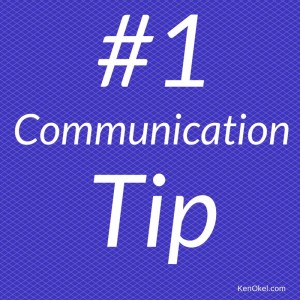 My #1 business communication tip is simple and challenging at the same time. It is all about how you deliver critical comments, about people, to others.
My #1 business communication tip is simple and challenging at the same time. It is all about how you deliver critical comments, about people, to others.
The use of this tip can save you a ton of time spent dealing with misunderstandings, which are one of the biggest causes of lost productivity. It can also help you avoid hard feelings that can cause you to lose professional friendships and allies.
Here it is: Do not say anything about someone that you would not say to that person’s face.
In other words, be honest but diplomatic. Why? Because emails and text messages that you consider to be confidential, may be accidentally forwarded to the wrong people. This happens at an alarming rate as some people do not understand the true meaning of “forward” or “reply all.”
Phone calls, that you thought were private, could be on speaker or easily overheard. Your comments do not exist in a bubble that cannot be penetrated. These mediums, when shared, also may not convey the context of your remarks.
Your honest, uncensored evaluation of someone’s talents or performance may be totally accurate but it can also torpedo your career. Instead, communicate a version of the truth that you would be willing to tell to the face of the person you may be criticizing.
Imagine that you are asked to evaluate your coworker, Joe, for a promotion. You may feel that Joe is a total idiot who is barely able to put on matching shoes every morning. When you get the email asking to evaluate him, would you be willing to use this description? Would you use it if Joe was the room? Probably not.
Instead, you would want to say something like, “While Joe has shown improvement during his time with our company, I don’t believe that he is ready for greater responsibility.”
Joe may not agree with this position but there’s nothing personal about it that he can throw back in your face. You’re delivering a sanitized, subjective opinion. If Joe were to learn of your comment, he might not join your fan club but he won’t devote his life to getting back at you, spreading gossip about you, or just giving you mean looks. And you won’t have to spend time doing damage control.
I’ve found that the same rule also works well with compliments.
Before you open your mouth or type on a keyboard, imagine that the subject of your remarks is right next to you.






